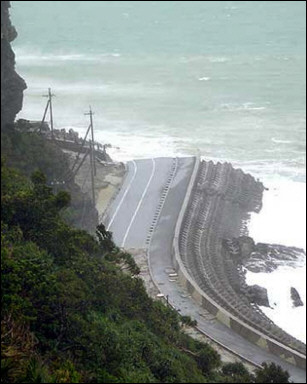Some notes on things.
Reasoned discourse points to the gaps between what those in power are saying, and what they're doing. Which is good as far as it goes, but at some point it stops being an accusation and becomes the diary of a victim. Bound and gagged - watching the psychopath from across the room as he sharpens his knives.
Military law was quietly changed after 9/11; as of yet no terrorists have been prosecuted under the new laws; the US Supreme Court says
non-nationals captured in Iraq aren't covered by the Geneva Conventions.
Which, ostensibly,
we wrote, to insure that less moral nations would understand there were things that would not be allowed to take place. This adolescent work-around of moral codes comes right out of the Old Testament and its cultural landscape. Jots and tittles, each rule defined so tightly that anything not clearly stated as prohibited becomes permissible; when the truth is, the law is a prosthetic conscience, a mechanical aid to the handicapped, not an arbiter of behavior.
It's an arbiter of non-behavior, it's an attempt to make concrete the things we aren't supposed to do. But in order to be accurate, and fair, it has to itemize those things. Which means anything new, that was unknown when the laws were written, won't be covered.
Once that's placed in the hands of God, we're home free.
If it's a human task to write the laws, then it's an attempt - and we should honor that attempt,
by thinking deeply about the spirit of the law, beyond its actual letter.
But again, if all our law flows from above, everything's covered, and whatever isn't covered is fine, we're good to go.
And again, if law comes up from out of the flux of human endeavor we have a responsibility to find the heart of its intent, as adults, as thinking moral actors, rather than lawyer against the vanished past, which can't defend itself and its creations against the onslaught of greed and viciousness the present has mounted in opposition to everything that gets in the way of its desire.
Someone needs to articulate the possibility that what's happening now has nothing to do with law, and everything to do with will. Democracy was a stepping stone to this, not a goal, and it's being abandoned - as the common people will be abandoned in turn, when they've served their purpose or are no longer useful.
It's childish to keep pretending Bush was mistaken about Iraq, and it's adolescent to keep thinking the invasion and occupation have been about oil. These ideas are not matched by events.
There's only been one clear advantage gained in the "war in Iraq" - aside from the individual graft and corrupt profits of the corporate entities Bush is so beholden to - and that's been the government of Israel's strategic safety in the larger Middle East.
That possibility is further confirmed by the cowardly posturing and bullying toward Syria and Iran both Israel and the US have recently been demonstrating. Just as you'd expect if it was the case that Israel's safety was the reason for the invasion to begin with.
In order to accomplish this, using the generated wealth of the American people, it was necessary to reduce the majority, or a functioning majority, of Americans to a state of childlike helplessness, and have them depend entirely on a few easily controlled news "vendors" for their information about what was being done in their names.
A combination of religious simplicity and seductive hedonism caught that majority squarely between the eyes, and took their money and diverted their attention, and most importantly their possibility, and ultimately their hope.
Once the people had been regressed to childish dependency they could no longer afford to question those they depend on to survive.
It's relatively complicated compared to the elementary-school narrative of Bush himself somehow stealing the election, or at its most complex his more immediate "advisors" or managers, and then invading Iraq because they were stupid, or greedy, or both. They are, they were then and they are now, but they're also scared, and weak.
There are more players on the board than are visible to us out here on the margins of things, and some of them aren't scared at all, players whose only real weakness is moral - they're cowards, slowly refining themselves into heroes, by removing every last scrap of evidence that refutes their claim to speciality.










